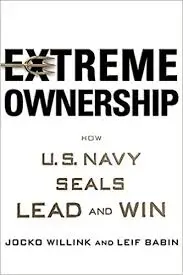Last updated on May 16th, 2024 at 11:00 pm
Quick Links
ToggleUnlock “10 Key Takeaways on How to be a Better Leader and a Better Team Mate” with our comprehensive guide. Discover essential leadership qualities, learn from real-life examples, and elevate your leadership skills to new heights.
Introduction:
“Leadership is not about being in charge. It’s about taking care of those in your charge.” – Simon Sinek
In the dynamic world of leadership and teamwork, the philosophy of extreme ownership, as delineated by ex-U.S. Marines Jocko Willink and Leif Babin in their influential book “Extreme Ownership,” unveils profound insights. This comprehensive exploration aims to dissect each key takeaway, extracting actionable wisdom for those who aspire to elevate their leadership and teamwork skills.
During the recent Mainyard Studio live webinar series titled ‘From Struggle to Success,’ our featured speaker expressed a candid viewpoint on individuals discussing personal development, referring to them as somewhat arrogant. It’s crucial to note that the speaker is actively engaged in the field of personal development, specializing in helping individuals reshape their mindset, navigate their emotions, and lead more fulfilling lives.
“Everything that happens in your life at any given moment is your fault.”
However, the speaker didn’t stop at this seemingly blunt characterization. They elaborated on the importance of personal development practices. Moreover, the speaker highlighted a significant distinction: one might come across as less than favorable only when they offer unsolicited advice, forcefully impose life-altering methods on others, or, worst of all, discuss personal development extensively without actively incorporating those principles into their own lives. This last scenario, according to the speaker, exposes individuals to the unsettling reality that, despite their outward appearance of success, their personal life is far from harmonious behind the scenes.
1. Everything is Your Responsibility: The Core Tenet of Extreme Ownership
“The best leaders are those most interested in surrounding themselves with assistants and associates smarter than they are.” – John C. Maxwell
Embracing extreme ownership starts with a profound commitment to accountability. Acknowledging that every facet of one’s life is their responsibility fosters a proactive mindset, crucial for effective problem-solving and continuous personal growth.
2. No Bad Teams, Only Bad Leaders: The Leadership Paradox
“A leader knows the way, goes the way, and shows the way.” – John C. Maxwell
This principle underscores the pivotal role of leadership in shaping a team’s destiny. Effective leaders set high standards, foster accountability, and create an environment where continuous improvement is not just encouraged but expected. The paradox lies in the leader’s ability to transform a failing team into a winning one.
3. Believe in the Mission: Leadership as a Belief System
“Success is not final, failure is not fatal: It is the courage to continue that counts.” – Winston S. Churchill
Leadership transcends mere responsibility; it is a belief system. True leaders must genuinely believe in the mission’s greater cause. This authentic belief becomes the driving force that propels individuals and teams to overcome challenges and achieve remarkable results.
4. Egos Cause Issues: The Humility Imperative
“Humility is not thinking less of yourself, it’s thinking of yourself less.” – C.S. Lewis
Ego, the silent disruptor, can derail even the best-laid plans. Extreme ownership demands humility, urging leaders to check their egos at the door. By admitting mistakes, taking ownership, and implementing corrective measures, leaders create an environment conducive to growth.
5. Cover and Move: Teamwork Unveiled
“Coming together is a beginning, staying together is progress, and working together is success.” – Henry Ford
The essence of teamwork lies in mutual support and collaboration. “Cover and move” encapsulates the idea that every team member must support others, breaking down silos and ensuring the success of the entire team, not just individual components.
‘If you are a teammate or employee this practice means acknowledging and owning up to the fact that you didn’t do what you said you would do regardless of what stopped you from doing it.’

6. Keep it Simple: The Art of Effective Communication
“If you can’t explain it simply, you don’t understand it well enough.” – Albert Einstein
Simplicity is the cornerstone of effective communication. Plans and strategies must be communicated in a manner that is simple, clear, and concise. When everyone understands their role and the overarching mission, the likelihood of success significantly increases.
7. Prioritize and Execute: Decoding Decision-Making Dynamics
“The essence of strategy is choosing what not to do.” – Michael E. Porter
In the chaos of decision-making, the ability to prioritize is paramount. Leaders must identify the most critical problems, develop effective solutions, and direct resources toward execution. This principle prevents target fixation and ensures a dynamic response to evolving challenges.
If you can put your hand on your heart and say that you have done all of the above and the results are still poor, then you can know for certain that this person cannot or will not do their job.’
8. Decentralize Command: Trusting the Chain of Command
“The best executive is the one who has sense enough to pick good men to do what he wants done, and self-restraint to keep from meddling with them while they do it.” – Theodore Roosevelt
Acknowledging human limitations, decentralizing command empowers junior leaders. Trust is the currency here—leaders must trust their subordinates to make informed decisions while maintaining a higher-level perspective to guide overall strategy.
9. Plan: Crafting a Blueprint for Success
“Plans are nothing; planning is everything.” – Dwight D. Eisenhower
Planning is not just about creating a roadmap but ensuring everyone understands it. Effective leaders delegate planning responsibilities, empowering team members at all levels. A comprehensive plan, communicated clearly, becomes the guiding beacon for mission success.
10. Leading Up and Down the Chain of Command: The Two-Way Street of Leadership
“The best way to predict the future is to create it.” – Peter Drucker
Leadership involves a two-way street of communication. Leaders must constantly evaluate their effectiveness in conveying the strategic vision to their teams. Simultaneously, they must be receptive to feedback, integrating it into tactical adjustments for continuous improvement.

11. Extreme Ownership in Practice: Real-Life Applications
“Leadership is not about being in charge. It’s about taking care of those in your charge.” – Simon Sinek
Delving into real-life scenarios where extreme ownership principles have been successfully applied provides a tangible understanding of how these concepts translate into action. Case studies and examples offer valuable insights into the adaptability and effectiveness of extreme ownership.
14 leadership qualities
Visionary Thinking:
-
- Ability to set a compelling and forward-thinking vision.
Effective Communication:
-
- Clear and articulate communication skills.
Integrity:
-
- Commitment to honesty, ethical behavior, and consistency.
Empathy:
-
- Understanding and connecting with the emotions and perspectives of others.
Decisiveness:
-
- Capability to make timely and firm decisions.
Adaptability:
-
- Flexibility and openness to change and innovation.
Resilience:
-
- Capacity to bounce back from setbacks and learn from failures.
Inspiration:
-
- Motivating and inspiring team members to achieve their best.
Accountability:
-
- Taking responsibility for one’s actions and the outcomes of the team.
Collaboration:
-
- Fostering teamwork and encouraging a collaborative work environment.
Courage:
-
- Willingness to take risks and confront challenges head-on.
Strategic Thinking:
-
- Ability to think strategically and plan for long-term success.
Self-Awareness:
-
- Understanding one’s strengths, weaknesses, and personal impact on others.
Delegation:
-
- Effective delegation of tasks to appropriate team members.
FAQs:
What are the core qualities of a good leader?
Good leaders possess qualities such as vision, effective communication, integrity, empathy, decisiveness, adaptability, resilience, inspiration, accountability, collaboration, courage, strategic thinking, self-awareness, and effective delegation.
How can I enhance my leadership skills?
Enhance your leadership skills by setting a clear vision, practicing effective communication, fostering a collaborative environment, embracing adaptability, learning from failures, and continually developing self-awareness.
Why is empathy important for a leader?
Empathy is crucial for a leader as it builds strong connections, fosters understanding within teams, and promotes a positive and supportive work environment, ultimately leading to increased team cohesion and productivity.
What is the role of resilience in leadership?
Resilience in leadership enables individuals to bounce back from setbacks, learn from failures, and maintain a positive mindset in challenging situations, contributing to long-term success and the ability to navigate uncertainties.
How does effective delegation contribute to leadership success?
Effective delegation empowers team members, promotes skill development, and ensures tasks are efficiently managed. It allows leaders to focus on strategic initiatives while fostering a sense of ownership and responsibility within the team.
Can leadership skills be learned and developed over time?
Absolutely, leadership skills can be learned and developed through continuous learning, self-reflection, mentorship, and real-world experiences. Embracing a growth mindset and a commitment to improvement are key to evolving as a successful leader.
Conclusion:
In essence, extreme ownership is not a set of rigid rules but a dynamic framework that adapts to the complexities of leadership and teamwork. Embracing these principles requires commitment, humility, and a genuine desire for improvement. Aspiring leaders and team members can find inspiration and practical guidance in the profound insights derived from the experiences of ex-marines.
